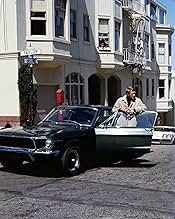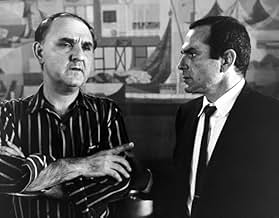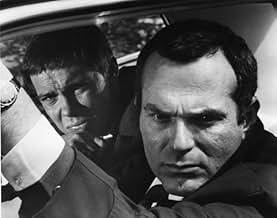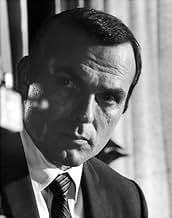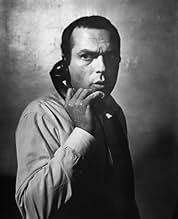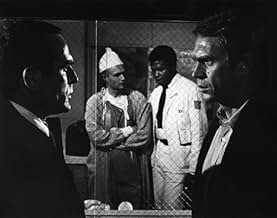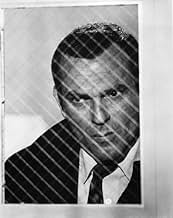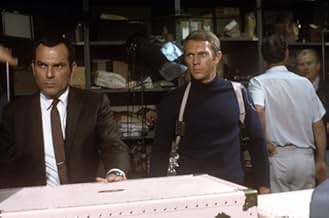Bullitt
- 1968
- Tous publics
- 1h 54min
Un policier de San Francisco, sans peur mais pas sans reproche, est bien déterminé à mettre la main sur le caïd de la mafia qui a assassiné un témoin sous sa protection.Un policier de San Francisco, sans peur mais pas sans reproche, est bien déterminé à mettre la main sur le caïd de la mafia qui a assassiné un témoin sous sa protection.Un policier de San Francisco, sans peur mais pas sans reproche, est bien déterminé à mettre la main sur le caïd de la mafia qui a assassiné un témoin sous sa protection.
- Réalisation
- Scénario
- Casting principal
- Récompensé par 1 Oscar
- 7 victoires et 9 nominations au total
Vic Tayback
- Pete Ross
- (as Victor Tayback)
Avis à la une
The late 1960s saw two classic, hard-boiled thrillers set in San Fransico; John Boorman's stylised 'Point Blank', and Peter Yates' 'Bullitt'. Calling your hero Bullitt might seem an unsubtle way to emphasise his macho qualities, but in fact Steve MacQueen plays him as a quiet man, not some wise-talking maverick: he does what he has to do, but takes no pleasure in his actions; and survives the roughness of his work not by becoming a monster, but simply by becoming a little less human. It's a believable portrait, and the film as a whole has a procedural feel: there are action scenes, but these are kept in their place in the overall design.
Today, the film is most famous for its celebrated car chase, which makes excellent use, as indeed does the movie as a whole, of the bay area locations, but is not actually shot that excitingly: the conclusion at the airport is more original, though it roots the film in the time when it was permissible to take a loaded gun onto a plane. But overall this is still a classy film, dry, exciting and bleak, and among the very best films of its day. William Friedkin's brilliant 'The French Connection', made a short while afterwards, would appear to owe it a debt.
Today, the film is most famous for its celebrated car chase, which makes excellent use, as indeed does the movie as a whole, of the bay area locations, but is not actually shot that excitingly: the conclusion at the airport is more original, though it roots the film in the time when it was permissible to take a loaded gun onto a plane. But overall this is still a classy film, dry, exciting and bleak, and among the very best films of its day. William Friedkin's brilliant 'The French Connection', made a short while afterwards, would appear to owe it a debt.
Steve McQueen's career peaked in 1968 with "Bullitt" and "The Thomas Crown Affair," both ideal vehicles for his cool persona. Although superior to its recent remake, "Crown" has not aged gracefully, while "Bullitt" has held up fairly well.
Cool though he may be, Frank Bullitt is a totally committed detective, perhaps even more so than Gene Hackman's Popeye Doyle or Clint Eastwood's Dirty Harry Callahan. Bullitt is a complete professional who never takes his eye off the objective, no matter how much interference he encounters from his superiors or from Robert Vaughan's scheming politician, Walter Chalmers. And Bullitt, unlike Doyle or Callahan, operates without the histrionics. No one-liners, no yelling and screaming tantrums from this officer. You may not like him very much, but you have to respect his dedication to duty and you'll quickly share his absolute contempt for Chalmers.
"Bullitt" is best remembered for its spectacular car chase in which McQueen reportedly did most of his own driving. But this is not primarily an action film. Aside from the chase and the final shootout at SFO, there's not a lot of violence. Most of the attention is on Bullitt's maneuvering to unravel the mystery and to keep Chalmers off his back.
Recommended if you like McQueen or policiers in general. The pace may be a little slow for people under 30 who are used to a more slam-bang, less cerebral approach to this sort of thing, but "Bullitt" is still worth your time. Just don't expect "Lethal Weapon."
Cool though he may be, Frank Bullitt is a totally committed detective, perhaps even more so than Gene Hackman's Popeye Doyle or Clint Eastwood's Dirty Harry Callahan. Bullitt is a complete professional who never takes his eye off the objective, no matter how much interference he encounters from his superiors or from Robert Vaughan's scheming politician, Walter Chalmers. And Bullitt, unlike Doyle or Callahan, operates without the histrionics. No one-liners, no yelling and screaming tantrums from this officer. You may not like him very much, but you have to respect his dedication to duty and you'll quickly share his absolute contempt for Chalmers.
"Bullitt" is best remembered for its spectacular car chase in which McQueen reportedly did most of his own driving. But this is not primarily an action film. Aside from the chase and the final shootout at SFO, there's not a lot of violence. Most of the attention is on Bullitt's maneuvering to unravel the mystery and to keep Chalmers off his back.
Recommended if you like McQueen or policiers in general. The pace may be a little slow for people under 30 who are used to a more slam-bang, less cerebral approach to this sort of thing, but "Bullitt" is still worth your time. Just don't expect "Lethal Weapon."
This movie is a great example of how style can prevail over substance in a film. The story is straight-forward enough, but nothing outstanding - Det. Bullitt is assigned to protect a witness who will testify against the mob. He must protect him for about 40 hours, but somehow, hitmen discover the location of the witness and gun him down before he can testify. Then Bullitt must find the hitmen, as well as deal with an identity twist concerning the witness.
However, the music score, tight direction, the car chase, McQueen's performance, and especially Robert Vaughn's performance as a ruthless politician make "Bullitt" worth watching. In fact the performances are excellent all the way through the cast (with the exception of Jacqueline Bisset, who's there only for eye candy and brings nothing special to her role).
Of course, the car chase is the most famous aspect of the film. Simply put, it's the best car chase ever filmed, bar none. It's been copied, and with today's technology, should have been exceeded. Yet it still stands alone. Why?
First, the presence of Steve McQueen - who else could bring it off as well as he did? Second, the era it came from, the late 60's. Films in those days didn't have chases, so it set the standard. There's no camera tricks or special effects to screw it up, what you see is what you get. It's just wouldn't be the same if one of today's big stars got in his BMW to chase another guy in a Porsche, complete with special effects, the obligatory explosions and slow-motion techniques.
If you've never seen it, watch it. If you have seen it, it still holds up after repeated viewings. 9 out of 10.
However, the music score, tight direction, the car chase, McQueen's performance, and especially Robert Vaughn's performance as a ruthless politician make "Bullitt" worth watching. In fact the performances are excellent all the way through the cast (with the exception of Jacqueline Bisset, who's there only for eye candy and brings nothing special to her role).
Of course, the car chase is the most famous aspect of the film. Simply put, it's the best car chase ever filmed, bar none. It's been copied, and with today's technology, should have been exceeded. Yet it still stands alone. Why?
First, the presence of Steve McQueen - who else could bring it off as well as he did? Second, the era it came from, the late 60's. Films in those days didn't have chases, so it set the standard. There's no camera tricks or special effects to screw it up, what you see is what you get. It's just wouldn't be the same if one of today's big stars got in his BMW to chase another guy in a Porsche, complete with special effects, the obligatory explosions and slow-motion techniques.
If you've never seen it, watch it. If you have seen it, it still holds up after repeated viewings. 9 out of 10.
Steve McQueen is Frank Bullitt! Frank Bullitt is slick! 'Bullitt' is thrilling! The stylish mystery thriller that created a basis for all future police procedurals to follow! With fantastic direction from Peter Yates and immaculate attention to detail on the stunning cinematography, 'Bullitt' is an attention-demanding and action-packed adventure supported by a jazz-fuelled score. When reviewing this crime flick, who could overlook the unforgettable Mustang v Charger chase through the streets of San Francisco which is arguably the greatest and most influential car chase ever filmed. 'Bullitt' is a dark and suspenseful masterpiece from Peter Yates.
What a change of pace this movie is as compared with its genre today. I'm no old fogey but would that modern directors become smart enough take several pages from its book.
The Bullit character is a precursor of Dirty Harry but a bit more cerebral. Stylistically, the director sets the stage beautifully for McQueen's Bullit. The movie has a European feel (director Peter Yates is a Brit) and achieves its dark mood through quiet understatement. The musical score for instance. Today, music is overly used, overly loud and manipulative. (i.e. in case you are not moved by this scene, here are a division of amplified violins to remind you to weep). In 'Bullit' the music is sparingly used and doesn't intrude at all. It complements the directorial style without setting the agenda.
The feeling of reserved naturalism is achieved through editing and dialogue. There really aren't very many lines in the movie and when characters do speak they are very succinct. Notice the last 15-20 minutes of the movie, most of which takes place at the airport. Hardly a line in it. There is none of the chattiness so prevalent today (especially post "Pulp Fiction") which is so tedious (unless the script is tip-top, which is rare).
Editing is, perhaps, its greatest strong point. The many long edits deserve equal credit with the dialogue in setting the low-key mood. The cinema verite dialogue of the airport scenes (and, say, the scene where McQueen and Don Gordon search the trunk) combined with the long cuts add greatly to understated feel while adding realism.
And the performances are top notch. The spare script helps McQueen shine since the taciturn moodiness fits his persona to a tee. There are very fine performances from all of the supporting cast, from Don Gordon to Bisset to Fell to Duvall to Oakland. This is a great movie for watching faces. Note the expressions of the hit men during the chase scene (just another example of this movie letting the little touches speak volumes).
The chase scene certainly deserves its billing as one of the best in movie history. Recently, 'The Transporter' was lauded for its opening chase sequence. The one in 'Bullit' is a marvel compared. In 'The Transporter' sequence I'm not sure there is a cut that lasts more than three seconds. In 'Bullit' it is again the editing which sets it apart here. The long edits give you the feel of acceleration and deceleration, of tire smoke and gears, of wind and the roller coaster San Francisco streets. You are given the time to place yourself in the frame. In short, 'Bullit' uses real craftsmanship. Films like 'The Transporter' use hundreds of quick edits to mimic the danger and immediacy of 'Bullit' but it comes across as hot air, confusion instead of clarity. The two scenes are perfect set pieces of easy (and hollow) Mtv-style flash versus real directorial substance.
The Bullit character is a precursor of Dirty Harry but a bit more cerebral. Stylistically, the director sets the stage beautifully for McQueen's Bullit. The movie has a European feel (director Peter Yates is a Brit) and achieves its dark mood through quiet understatement. The musical score for instance. Today, music is overly used, overly loud and manipulative. (i.e. in case you are not moved by this scene, here are a division of amplified violins to remind you to weep). In 'Bullit' the music is sparingly used and doesn't intrude at all. It complements the directorial style without setting the agenda.
The feeling of reserved naturalism is achieved through editing and dialogue. There really aren't very many lines in the movie and when characters do speak they are very succinct. Notice the last 15-20 minutes of the movie, most of which takes place at the airport. Hardly a line in it. There is none of the chattiness so prevalent today (especially post "Pulp Fiction") which is so tedious (unless the script is tip-top, which is rare).
Editing is, perhaps, its greatest strong point. The many long edits deserve equal credit with the dialogue in setting the low-key mood. The cinema verite dialogue of the airport scenes (and, say, the scene where McQueen and Don Gordon search the trunk) combined with the long cuts add greatly to understated feel while adding realism.
And the performances are top notch. The spare script helps McQueen shine since the taciturn moodiness fits his persona to a tee. There are very fine performances from all of the supporting cast, from Don Gordon to Bisset to Fell to Duvall to Oakland. This is a great movie for watching faces. Note the expressions of the hit men during the chase scene (just another example of this movie letting the little touches speak volumes).
The chase scene certainly deserves its billing as one of the best in movie history. Recently, 'The Transporter' was lauded for its opening chase sequence. The one in 'Bullit' is a marvel compared. In 'The Transporter' sequence I'm not sure there is a cut that lasts more than three seconds. In 'Bullit' it is again the editing which sets it apart here. The long edits give you the feel of acceleration and deceleration, of tire smoke and gears, of wind and the roller coaster San Francisco streets. You are given the time to place yourself in the frame. In short, 'Bullit' uses real craftsmanship. Films like 'The Transporter' use hundreds of quick edits to mimic the danger and immediacy of 'Bullit' but it comes across as hot air, confusion instead of clarity. The two scenes are perfect set pieces of easy (and hollow) Mtv-style flash versus real directorial substance.
Le saviez-vous
- AnecdotesSeveral items of clothing worn by Steve McQueen received a boost in popularity thanks to the film: desert boots, a trench coat, a blue turtleneck sweater and, most famously, a brown tweed jacket with elbow patches.
- GaffesDuring the chase sequence, the same green Volkswagen Beetle is seen at least 4 different times in 4 different locations in a period of not more than 1 minute.
- Versions alternativesDuring the car chase, when the Charger goes wide on a corner and hits a camera, the film was salvaged and red frames added at the end, to give a "point of impact" impression. Despite this gag being in situ for decades, on the current Cinemax Asia print, someone has seen fit to completely remove these last frames of the shot.
- ConnexionsEdited into Cité en feu (1979)
Meilleurs choix
Connectez-vous pour évaluer et suivre la liste de favoris afin de recevoir des recommandations personnalisées
- How long is Bullitt?Alimenté par Alexa
Détails
- Date de sortie
- Pays d’origine
- Langue
- Aussi connu sous le nom de
- Đại Tá Bullitt
- Lieux de tournage
- Coffee Cantata, Union Street, San Francisco, Californie, États-Unis(jazz club and restaurant scene)
- Société de production
- Voir plus de crédits d'entreprise sur IMDbPro
Box-office
- Budget
- 5 500 000 $US (estimé)
- Montant brut aux États-Unis et au Canada
- 511 350 $US
- Week-end de sortie aux États-Unis et au Canada
- 408 627 $US
- 7 oct. 2018
- Montant brut mondial
- 512 162 $US
Contribuer à cette page
Suggérer une modification ou ajouter du contenu manquant





